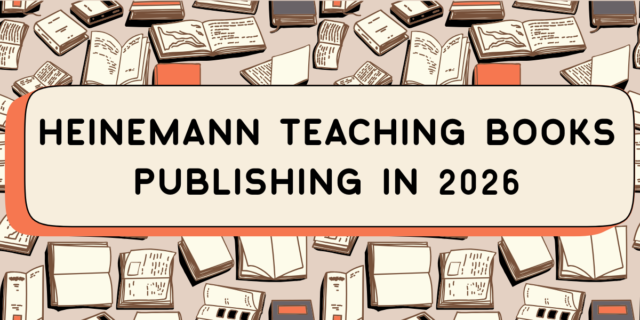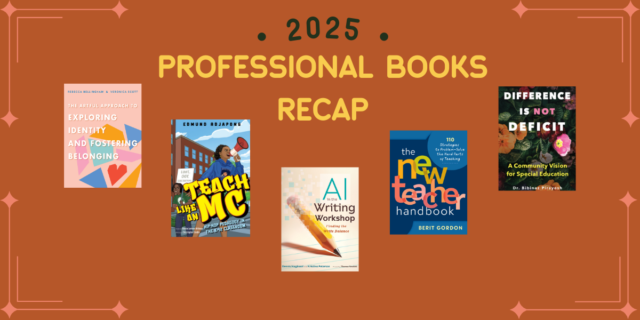
Looking to build your summer reading list with professional development books? Check out the following titles for personal growth through introspection, reflection, and new leader
New!: The New Teacher Handbook, by Berit Gordon

Goals and strategies for new teachers and the mentors who support them. Learn strategies for time management, engaging students, lesson planning, classroom management, and more.
Embarrassment, by Tom Newkirk

In this groundbreaking exploration, Newkirk offers practices and strategies that help kids and teachers alike develop a more resilient approach to embarrassment. “I contend that if we can take on a topic like embarrassment and shame, we can come to a richer, more honest, more enabling sense of who we are and what we can do,” he explains. “So let’s do battle. Let’s name and identify the enemy that can haunt our days, disturb our sleep, put barriers up to learning, and drain joy from our lives—and maybe we can also learn how to rearrange some things in our own head so that we can be more generous toward ourselves.”
The Caring Teacher, by Gianna Casetta and Margaret Wilson

With a clear eye on the realities of teaching, The Caring Teacher lays out specific strategies to build and improve even our most challenging relationships. Acknowledging teachers’ daily struggles, Cassetta and Wilson offer a variety of ways—from mindset shifts to small strategies—to improve all student relationships. These strategies can help us intentionally foster competence, relatedness, and autonomy in every student, giving them us the capacity to see their strengths and cultivate their roles as vital parts of our classroom communities.
Trauma-Responsive Pedagogy, by Arlène Casimir and Courtney Baker

Trauma-Responsive Pedagogy explores the research and practices around trauma-informed education in an easy-to-digest, actionable text that elevates the healing and wellness of both the children and the adults in our classrooms. It describes the challenges of a classroom that does not attend to adversity and trauma, then presents the research on trauma-responsive classrooms, and finally provides an inclusive framework that supports educators in centering the whole child in their classrooms—offering a recipe for what to do next period, next week, and next school year. Pedagogy that is trauma-responsive invites us to heal alongside our students while explicitly elevating evidence-informed teaching methods and practices and facilitating the necessary inner work to bring our whole being to the profession in healthy ways. Our students’ challenges are not a deterrent to their learning. Together, we can turn wounds into wisdom.
Learning from Loss, by Brittany Collins

Learning from Loss is your guide to getting started with grief work, providing a path that can help you determine the best course of action in the wake of a loss that impacts a student or school community. You will find research, stories, strategies, activities, and reflection questions that offer a map with which to navigate grief-responsive classroom practices. Brittany includes suggestions for collaborating with a school counselor or other trained intervention professional should you have access to one, as well as alternatives if you do not.
Humans Who Teach, by Shamari Reid

Humans Who Teach invites readers to explore the complicated humanity of those who teach, with a focus on how we have been socialized to accept the status quo, our very real fears in disrupting the status quo, and how we can rely on our human capacity to love to engage in teaching for social justice even in the presence of fear
The First Five, by Patrick Harris

In The First Five, Patrick brings to light the realities of teaching, especially in the first five years. He immerses you in his world with personal stories that lead to lessons, questions, and exercises to help you reflect on your own journey. Each chapter includes interviews with a diverse group of educators.
Textured Teaching, by Lorena Germán

With Culturally Sustaining Practice as its foundation, Textured Teaching helps secondary teachers in any school setting stop wondering and guessing how to implement teaching and learning that leads to social justice. Lorena shares her framework for creating a classroom environment that is highly rigorous and engaging, and that reflects the core traits of Textured Teaching: student-driven, community centered, interdisciplinary, experiential, and flexible. Throughout the book, Lorena shares lesson design strategies that build traditional literacy skills while supporting students in developing their social justice skills at the same time. The actionable strategies Lorena uses to bring Textured Teaching values to life illuminate what is possible when we welcome all types of texts, all types of voices, and all forms of expression into the classroom.
Start Here, Start Now, by Liz Kleinrock

Start Here, Start Now addresses many of the questions and challenges educators have about getting started with antibias and antiracist work, using a framework for tackling perceived barriers from a proactive stance. Liz answers the questions with personal stories, sample lessons, anchor charts, resources, conversation starters, extensive teacher and activist accounts, and more.
Risk. Fail. Rise., by M. Colleen Cruz

In Risk. Fail. Rise. teachers will learn how to address their own teaching mistakes, model with their own mistake-making, and improve their response to others' mistakes. Colleen shares what research studies say on mistake-making as part of learning and what that means for teaching. She provides research, examples, and tools that help teachers destigmatize mistake-making so that they and their students can do the real work of growth.
The Right Tools, by Towanda Harris

In The Right Tools, Towanda Harris lays out a path that teachers and administrators can use to make informed decisions about what resources and practices they need for the students they teach. Rather than telling you what to buy or use, Towanda offers tools and guidance to help you to make that decision.
Kids First From Day One, by Christine Hertz and Kristine Mraz

The classroom of your dreams starts with one big idea. From the first days of school to the last, Kids First from Day One shares how to put your deepest teaching belief into action. Whether it's building community, designing your classroom spaces, matching instruction to students' needs, or engaging students in curriculum, Christine Hertz and Kristi Mraz help you put into action the belief that children are the most important people in the room.
***
This is part of Heinemann's "bookshelves" where you can find topic-specific book lists teachers need to navigate educational spaces.


